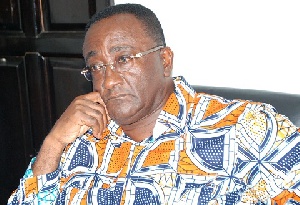 Minister for Agriculture, Dr. Owusu Afriyie Akoto
Minister for Agriculture, Dr. Owusu Afriyie Akoto
The Association of Junior Veterinary Surgeons (AJVS), Ghana, has given the government a 31-day ultimatum to resolve issues surrounding their employment and housemanship.
According to the association, the government had abandoned veterinary doctors to their fate, a development they described as very unfair.
In an interview with the DAILY HERITAGE, Dr Eben Kwasi Agyei Sarfo said the practitioners had not been treated fairly, especially in terms of the housemanship programme.
The housemanship, he explained, is a mandatory exercise for all graduated veterinary doctors before being accepted by the Veterinary Council of Ghana as competent to practice veterinary medicine in the country.
He told the paper that the previous batch of graduates who undertook their housemanship two years ago were not offered appointment letters before they started.
“After our housemanship, it took us close to two years for us to receive our salaries and after that I detected that there were something wrong. I realised that they had not paid our social security fees and taxes that they told us they had deducted us for,” he said.
Also speaking to the paper, Dr Yehowada Akwesi, Secretary, AJVS, lamented about the level of attention that governments have given to the profession.
She said the Veterinary Service holds the key to tackling some emerging human diseases, adding that, “it will be a misplaced priority for a country to approach health non-holistically by concentrating on human health services alone.
“The condition of veterinary service in the country is very poor. Our work is not restricted to just dealing with animals but we take care of human health as well.”
She bemoaned the poor facilities available for them at health centres, adding that, “we lack basic facilities and apparel to discharge our duties.”
Strange disease and death
He disclosed to the paper that the association lost one of its members when discharging his duties at the zoo. He said the colleague was believed to have contracted the disease from one of the animals.
“Just some weeks ago, a colleague, Dr Pius Benia, among the third batch of graduated veterinary doctors who are on their nondescript housemanship training, died of a mysterious disease.
“History gathered from the case suggested that he fell ill after handling a bat at the Accra Zoological Garden and started showing unusual signs. Medical practitioners of the 37 Military Hospital quarantined him under medical care until his demise. We are yet to know the autopsy report though. Simple personal protective equipment are not available for public veterinarians in practice,” she said.
Personnel
The secretary expressed the view that the government was doing little to increase the number of veterinary officers in the country.
According to her, health centres in the country were under staffed with veterinary officers, arguing that, “we need about 200 veterinary officers in our public health centres but we have only 49 officers.”
She further expressed displeasure about the decision to call back about 20 retired veterinary officers at the expense of the young unemployed ones.
Petition
In order to make known their challenges, the association has petitioned the President, Parliament, and the Ministries of Agriculture and Health.
In their petition, the association mentioned that “the housemanship training, which is supposed to be a mandatory exercise for all graduated veterinary doctors before being accepted by the Veterinary Council of Ghana as competent to practice veterinary medicine in the country, is in limbo.
“Two batches of veterinary house officers do not know their fate: the very first batch of locally trained veterinary doctors was only paid their housemanship salary by government in September 2017,” they mentioned.
They continued, “the third batch do not know whether they are on housemanship training or not since they were only posted by the Veterinary Council to proceed on the training without offer letters of employment.”
According to the association, “it will be a misplaced priority for a country to approach health non-holistically by concentrating on human health services alone, when the veterinary profession can be deployed as a primary point of preventive medicine.”